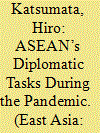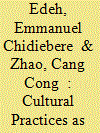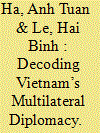|
|
|
Sort Order |
|
|
|
Items / Page
|
|
|
|
|
|
|
| Srl | Item |
| 1 |
ID:
186600


|
|
|
|
|
| Summary/Abstract |
What are the implications of COVID-19 for the diplomacy of the Association of Southeast Asian Nations (ASEAN)? What kinds of diplomatic tasks has the pandemic imposed on ASEAN, and in what way has the Southeast Asian association handled them? ASEAN’s most fundamental diplomatic task has of course been to continue building ASEAN communities, but the ability of the association of minor powers in Southeast Asia is limited. Hence, it can be said that ASEAN’s most important diplomatic task has been to maintain favorable relations with external powers, in particular, with China and the United States. The present study argues that ASEAN has managed to maintain favorable relations with and receive support from both of these external powers by conducting “equidistant diplomacy” with them. In concrete terms, it has fostered favorable relations with China. Yet, without relying excessively on Beijing, it made sure to foster such relations with the United States as well, thereby striking a reasonable balance between these two external powers.
|
|
|
|
|
|
|
|
|
|
|
|
|
|
|
|
| 2 |
ID:
186604


|
|
|
|
|
| Summary/Abstract |
China’s One Belt One Road (OBOR) centres on building a harmonious world, by reorienting the already tumultuous international community, towards the path of sustainable, peaceful and harmonious coexistence. From a cultural perspective, the OBOR is a heritage, an embodiment of brilliant civilization, glorious historic past and extraordinary creativity of mankind. It harbours both tangible and intangible representations of the values, beliefs, traditions and lifestyles of prior generations that are valuable to the present generations. Evidence of historical socioeconomic development and intricacies thrived on the exchange of cultural values shared by all mankind. By drawing from diverse conceptual frameworks embedded in traditional Chinese cultural values, the study offers an insightful illustration of cultural practices in contemporary China’s socioeconomic development through the OBOR. Capturing how cultural values underpins the socioeconomic development pattern in OBOR, geopolitical decisions and actions aimed at managing conflicts and the inclusive nature of OBOR.
|
|
|
|
|
|
|
|
|
|
|
|
|
|
|
|
| 3 |
ID:
186603


|
|
|
|
|
| Summary/Abstract |
This article explains Vietnam’s recent proactive approach to multilateral diplomacy, defined as diplomatic performance in multilateral institutions. It argues that Hanoi’s embrace of multilateral diplomacy is best explained through the lens of national interests. Vietnam has consistently placed its foreign policy in the broader dynamics of international politics. Since Ho Chi Minh, the founding father of the nation, started his struggle for the national liberation of Vietnam, multilateral institutions have been perceived as one important direction to raise Vietnam’s voice and gather supports from the international community to serve the country’s utmost interest of gaining national independence. After the independent state of Vietnam was established, Hanoi continued to pursue multilateral diplomacy to advance Vietnam’s national interests of defending the country’s security, advancing socio-economic development, and improving its role and stance in the international community. This approach is particularly hailed in recent years as a way to avoid becoming a proxy to big power competition, to mitigate significant security challenges, and to sustain economic development.
|
|
|
|
|
|
|
|
|
|
|
|
|
|
|
|
| 4 |
ID:
186599


|
|
|
|
|
| Summary/Abstract |
Vietnam is a key player in India’s Act East Policy and is distressed due to China’s overarching position in the South China Sea. China’s expanding infrastructural investments in India’s periphery have led to a regional security dilemma in Indian Ocean Region. India is steered to pursue opportunities to counter China in the latter’s periphery, to which Vietnam fits as an apt ally. Hence, this paper examines the heightened need for realigning India’s Vietnam policy in line with United Nations Sustainable Development Goals and explains how bilateral cooperation through sustainable trade, renewable energy production, and green investments can offer a “counter” to Chinese expansion in Indo-Pacific and its Belt and Road Initiative. This paper uses the theoretical framework of Balance of Power to enumerate how geostrategic policy decisions in India-Vietnam bilateral relations can create a “counterbalance” to the Chinese investments in India’s neighborhood, especially in Pakistan.
|
|
|
|
|
|
|
|
|
|
|
|
|
|
|
|
| 5 |
ID:
186602


|
|
|
|
|
| Summary/Abstract |
The aim of the study is to identify the role of the People’s Republic of China in the activities of the organisation, based on the Chinese vision of its role in the Shanghai Cooperation Organisation as one of the ideological and philosophical leaders that determine its focus and ideology. In particular, China implements the principle of polycentrism in Eurasia and interstate partnership and promotes the idea of state-regulated economic globalisation. The methodology of this scientific research is based on the analytical method of studying the issues related to the topic of the scientific research. China proceeds from the concept of ensuring full sovereignty by the member states of the organisation, but against the backdrop of low development rates of national economies (up to 2–2.5%) and lack of awareness by countries of their national interests in the region, Chinese business will strengthen its expansion, relying on both the World Trade Organisation rules and using protectionist measures by absorbing ineffective business entities. China is guided by the principles of non-interference in the internal affairs of other states, while maintaining its socio-political model based on the fusion of the communist ideology and the traditional philosophical doctrines of China and the mentality of the country’s population, excluding the democracy export policy, denying the desire for undivided hegemony and to rule the world community. This is confirmed by the main key elements of the People’s Republic of China’s foreign policy, determined by the Chinese leadership.
|
|
|
|
|
|
|
|
|
|
|
|
|
|
|
|
| 6 |
ID:
186601


|
|
|
|
|
| Summary/Abstract |
The Korean War (1950–1953) was one of the most calamitous and brutal wars in modern history. It was fought by the post-colonial people of the peninsula, and it culminated in the creation of two ideologically opposed states, but the three years’ military clash in East Asia (or the Far East) is often labelled simply as a “Forgotten War” in the West including North America. The ensuing ethnic division has been interpreted through the various geopolitical lenses of military strategy, politics, international relations, and power games. What about the situation of casualties? Which particular nations in the United Nations (UN) dispatched medical aid for the treatment of war victims? How did the Scandinavian allies participate the non-European war? What were their unique characteristics among non-military supporting nations? What legacy they left for the post-war Koreans? This paper explores the military-historical backgrounds by which each of the following Northern European nation, namely, Sweden, Denmark, and Norway, decided to send unarmed skilled personnel to aid South Korea. The paper argues the social voluntarism of the neutral group in the critical insight that the field activities of Swedish Seojeon Byungwon, Danish Jutlandia, and Norwegian NORMASH individually promoted the Red Cross spirit of advanced humanitarianism on the top of mandatory duty, in giving special attention on children (orphans), women, civilians, POWs, and medical education, as well as the post-war collaboration for the initial Korean public health system in the 1960s.
|
|
|
|
|
|
|
|
|
|
|
|
|
|
|
|
|
|
|
|
|